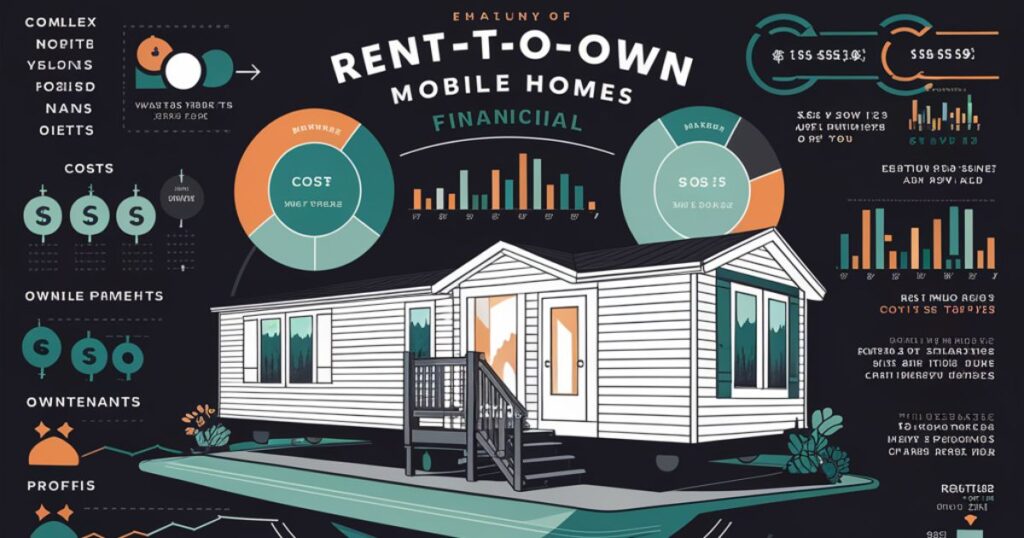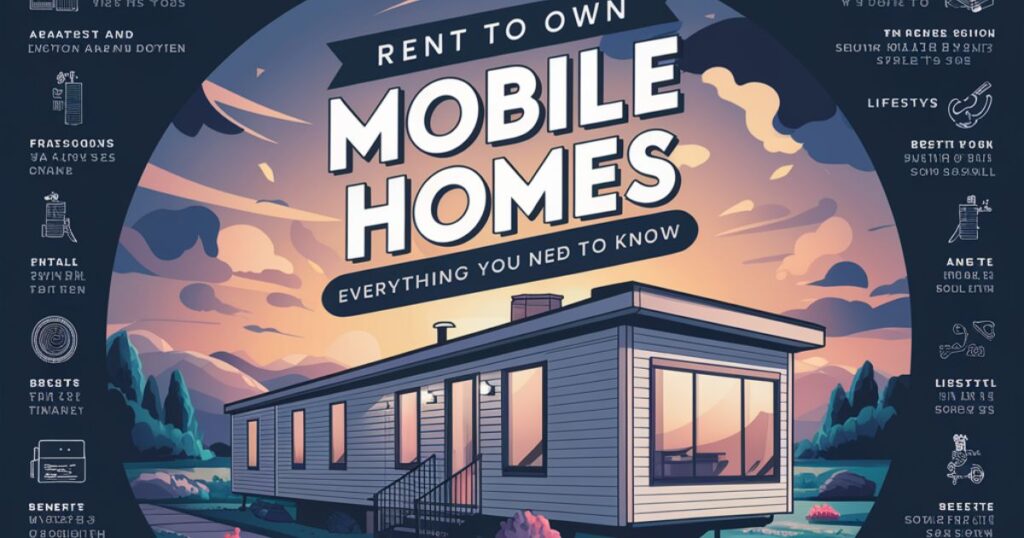Are you dreaming of owning a home but feel like the traditional path to homeownership is out of reach? Rent-to-own mobile homes might just be the solution you’ve been searching for.
This innovative approach combines the flexibility of renting with the pride of ownership, offering an affordable and accessible way to achieve your homeownership goals.
In this comprehensive guide, we’ll dive deep into the world of rent-to-own mobile homes, exploring the concept, the benefits, and everything you need to know to make an informed decision. Get ready to unlock a new path to the American dream.
What are Rent-to-Own Mobile Homes?
Rent-to-own mobile homes, also known as lease-to-own or rent-to-buy, are a unique type of agreement that allows you to rent a mobile home for a specified period, with the option (or obligation) to purchase it at the end of the lease term.
There are two main variations of rent-to-own agreements:
- Lease-Option Contract: With this type of agreement, you have the option to purchase the mobile home after the lease period ends. You’re not obligated to buy, giving you the flexibility to decide if the home and community are the right fit.
- Lease-Purchase Contract: In this case, you commit to purchasing the mobile home once the lease term is over. It’s a more binding agreement, but it also provides a clear path to homeownership.
Benefits of Rent-to-Own Mobile Homes
Rent-to-own mobile homes offer several advantages that make them an attractive option for many homebuyers:
- Build Equity While Renting: A portion of your monthly rent payment goes towards building equity in the mobile home, helping you gradually work towards ownership.
- Lock in Purchase Price Upfront: With rent-to-own agreements, you can lock in the purchase price of the mobile home at the start of the lease. This protects you from potential increases in property values during the lease term.
- Flexibility and Affordability: Renting-to-own allows you to enjoy the benefits of homeownership without the immediate financial burden of a large down payment or mortgage.
- Path to Homeownership: For those who may not qualify for traditional mortgages or have limited credit history, rent-to-own mobile homes offer a stepping stone towards homeownership.
Read this Post: 6 VIBRANT EXTERIOR PAINT COLOR IDEAS FOR YOUR MOBILE HOME
The Rent-to-Own Process
Now that you understand the basics of rent-to-own mobile homes, let’s explore the step-by-step process of how it works.
Step-by-Step Guide to the Rent-to-Own Process
- Finding the Right Community and Mobile Home: Start by researching and visiting different mobile home communities in your desired area. Look for well-maintained homes that meet your needs and preferences.
- Understanding the Terms of the Agreement: Once you’ve found a suitable mobile home, carefully review the rent-to-own agreement. Pay close attention to details such as the lease term, monthly rent payments, option fees, and purchase price.
- Option Fees and Rent Premiums: Most rent-to-own agreements require an upfront option fee, which secures your right to purchase the mobile home at the end of the lease. Additionally, you may be required to pay a rent premium, which is an extra amount on top of your regular rent that contributes to building equity.
- Maintaining the Property During the Lease: During the lease term, you’ll be responsible for maintaining the mobile home and keeping it in good condition, just as you would if you were the owner.
- Exercising the Option to Purchase: As the lease term nears its end, you’ll have the opportunity to exercise your option to purchase the mobile home. If you decide to proceed, you’ll need to secure financing (if applicable) and complete the necessary paperwork to finalize the purchase.
Financial Considerations

When exploring rent-to-own mobile homes, it’s crucial to consider the financial implications and plan accordingly.
Importance of Credit Score and Credit History
Your credit score and credit history play a significant role in your ability to secure favorable financing options for the eventual purchase of the mobile home.
During the lease term, make sure to maintain a good payment history and work on improving your credit score if necessary.
Budgeting for Rent, Option Fees, and Eventual Purchase
Rent-to-own agreements often require an upfront option fee and potentially higher monthly rent payments compared to traditional rentals.
It’s essential to create a detailed budget that accounts for these additional costs, as well as the eventual purchase price of the mobile home.
Financing Options for the Final Purchase
When the time comes to exercise your option to purchase, you’ll need to secure financing. Here are some potential options:
- Conventional Mortgage: If your credit score and income qualify, you may be able to obtain a traditional mortgage for the purchase.
- Personal Loans or Home Equity Loans: Explore personal loans or home equity loans as alternative financing sources.
- Seller Financing: Some mobile home sellers may offer in-house financing options, which can be a viable choice if you don’t qualify for traditional mortgages.
Tax Implications and Benefits of Rent-to-Own
It’s important to consult with a tax professional to understand the potential tax implications and benefits of rent-to-own mobile homes.
In some cases, a portion of your rent payments may be tax-deductible, and there may be other tax advantages depending on your specific situation.
Choosing the Right Rent-to-Own Mobile Home Community
Not all mobile home communities are created equal, and selecting the right one is crucial for your overall satisfaction and long-term investment.
Factors to Consider When Selecting a Community
When evaluating potential mobile home communities, consider the following factors:
- Location and Proximity to Amenities: Look for communities that are conveniently located near schools, shopping centers, parks, and other amenities that align with your lifestyle.
- Community Rules and Regulations: Familiarize yourself with the community’s rules and regulations to ensure they align with your expectations and preferences.
- Amenities and Facilities Offered: Evaluate the community’s amenities, such as recreational facilities, clubhouses, and common areas, to ensure they meet your needs.
- Maintenance and Management Services: Inquire about the community’s maintenance and management services to understand the level of upkeep and support provided.
Researching and Vetting Potential Communities
Before committing to a rent-to-own agreement, take the time to thoroughly research and vet potential mobile home communities. Here are some tips:
- Online Reviews: Read online reviews from current and past residents to gain insights into the community’s reputation and overall experience.
- Community Visits: Schedule visits to the communities you’re interested in to get a first-hand look at the homes, facilities, and overall atmosphere.
- Speak with Residents: If possible, strike up conversations with current residents to get an insider’s perspective on life in the community.
- Check Public Records: Conduct a public records search to uncover any past issues or complaints related to the community or its management.
Advantages and Disadvantages of Rent-to-Own Mobile Homes
Like any major decision, rent-to-own mobile homes come with pros and cons that should be carefully considered.
Pros of Rent-to-Own Mobile Homes
- Affordable Homeownership: Rent-to-own mobile homes offer a more affordable path to homeownership compared to traditional home purchases.
- Flexibility and Trial Period: The lease term allows you to “try out” the mobile home and community before committing to a purchase.
- Building Equity: A portion of your rent payments goes towards building equity in the mobile home, which can be a valuable investment.
- Potential for Appreciation: If the mobile home’s value increases during the lease term, you may benefit from that appreciation when exercising your option to purchase.
Cons of Rent-to-Own Mobile Homes
- Limited Choice and Availability: The selection of rent-to-own mobile homes may be more limited compared to traditional home purchases.
- Potential for Misunderstandings or Disputes: Rent-to-own agreements can be complex, and misunderstandings or disputes with the seller may arise if terms are not clearly understood.
- Maintenance Responsibilities During the Lease: You’ll be responsible for maintaining the mobile home during the lease term, which can be an added expense and time commitment.
Tips for a Successful Rent-to-Own Experience

To ensure a smooth and successful rent-to-own experience, follow these tips:
Thoroughly Review and Understand the Contract
Before signing any rent-to-own agreement, carefully review and understand every detail of the contract.
Pay close attention to the terms, conditions, and obligations of both parties. Don’t hesitate to seek legal advice if you have any questions or concerns about the agreement’s language or clauses.
Maintain Open Communication with the Landlord/Seller
Establishing and maintaining open lines of communication with the landlord or seller is crucial throughout the rent-to-own process. Address any issues or concerns promptly and professionally to avoid misunderstandings or disputes down the line.
Inspect the Mobile Home and Community Before Signing
Before committing to a rent-to-own agreement, make sure to conduct a thorough inspection of the mobile home and the community.
Look for any potential issues or needed repairs, and ensure that the property meets your expectations and standards.
Budget for All Associated Costs
In addition to the monthly rent and potential option fees, be prepared to budget for other associated costs, such as:
- Utilities
- Maintenance and repairs
- Community fees or homeowners’ association dues
- Property taxes (if applicable)
- Insurance
Carefully plan and allocate funds for these expenses to avoid any financial surprises.
Seek Legal Advice if Needed
While rent-to-own agreements can be straightforward, they can also involve complex legal and financial considerations.
If you have any doubts or concerns, don’t hesitate to seek advice from a qualified legal professional who can review the agreement and ensure your interests are protected.
Conclusion
Rent-to-own mobile homes offer a unique and accessible path to homeownership, combining the flexibility of renting with the pride and investment of ownership.
By understanding the process, weighing the pros and cons, and following best practices, you can navigate this alternative route with confidence.
Remember, the key to a successful rent-to-own experience lies in thorough research, open communication, and careful planning.
Embrace the opportunity to build equity, lock in a purchase price, and work towards your dream of homeownership one step at a time.
If you’re ready to explore the world of rent-to-own mobile homes, start your search today. Visit communities in your desired area, ask questions, and find the perfect fit for your needs and budget.
With the right approach, you could be well on your way to calling a cozy mobile home your own.

Ava, boasting five years in home blogging, shares expertise in domestic living. With a sharp eye and passion for details, she navigates home decor and lifestyle intricacies effortlessly.







